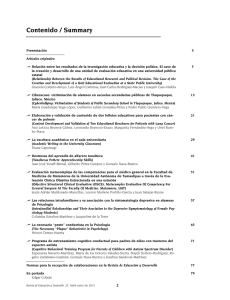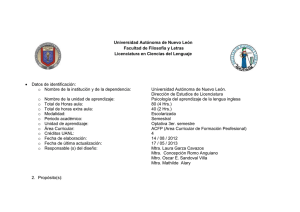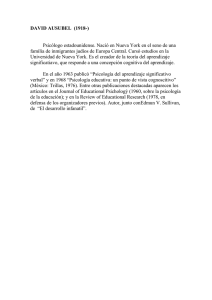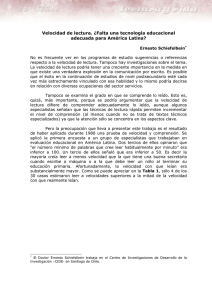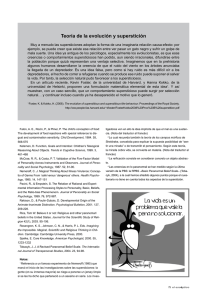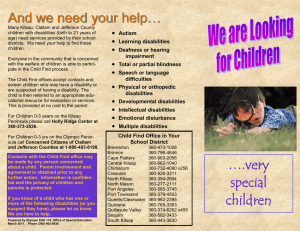Tema: 11. Necesidades educativas especiales
Anuncio
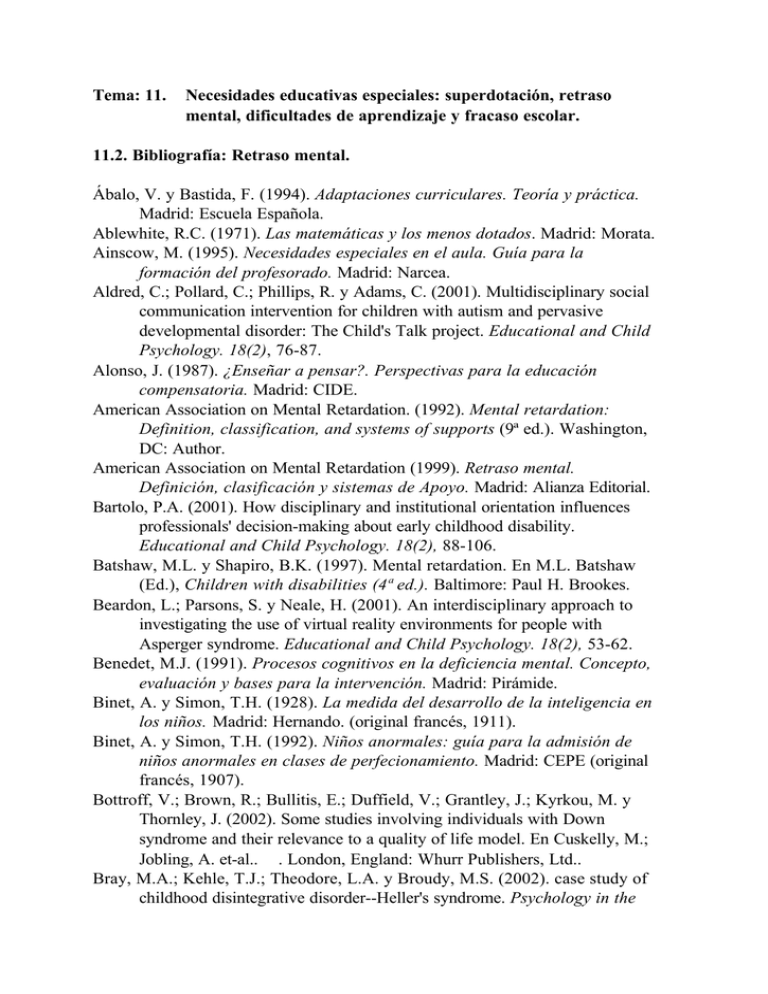
Tema: 11. Necesidades educativas especiales: superdotación, retraso mental, dificultades de aprendizaje y fracaso escolar. 11.2. Bibliografía: Retraso mental. Ábalo, V. y Bastida, F. (1994). Adaptaciones curriculares. Teoría y práctica. Madrid: Escuela Española. Ablewhite, R.C. (1971). Las matemáticas y los menos dotados. Madrid: Morata. Ainscow, M. (1995). Necesidades especiales en el aula. Guía para la formación del profesorado. Madrid: Narcea. Aldred, C.; Pollard, C.; Phillips, R. y Adams, C. (2001). Multidisciplinary social communication intervention for children with autism and pervasive developmental disorder: The Child's Talk project. Educational and Child Psychology. 18(2), 76-87. Alonso, J. (1987). ¿Enseñar a pensar?. Perspectivas para la educación compensatoria. Madrid: CIDE. American Association on Mental Retardation. (1992). Mental retardation: Definition, classification, and systems of supports (9ª ed.). Washington, DC: Author. American Association on Mental Retardation (1999). Retraso mental. Definición, clasificación y sistemas de Apoyo. Madrid: Alianza Editorial. Bartolo, P.A. (2001). How disciplinary and institutional orientation influences professionals' decision-making about early childhood disability. Educational and Child Psychology. 18(2), 88-106. Batshaw, M.L. y Shapiro, B.K. (1997). Mental retardation. En M.L. Batshaw (Ed.), Children with disabilities (4ª ed.). Baltimore: Paul H. Brookes. Beardon, L.; Parsons, S. y Neale, H. (2001). An interdisciplinary approach to investigating the use of virtual reality environments for people with Asperger syndrome. Educational and Child Psychology. 18(2), 53-62. Benedet, M.J. (1991). Procesos cognitivos en la deficiencia mental. Concepto, evaluación y bases para la intervención. Madrid: Pirámide. Binet, A. y Simon, T.H. (1928). La medida del desarrollo de la inteligencia en los niños. Madrid: Hernando. (original francés, 1911). Binet, A. y Simon, T.H. (1992). Niños anormales: guía para la admisión de niños anormales en clases de perfecionamiento. Madrid: CEPE (original francés, 1907). Bottroff, V.; Brown, R.; Bullitis, E.; Duffield, V.; Grantley, J.; Kyrkou, M. y Thornley, J. (2002). Some studies involving individuals with Down syndrome and their relevance to a quality of life model. En Cuskelly, M.; Jobling, A. et-al.. . London, England: Whurr Publishers, Ltd.. Bray, M.A.; Kehle, T.J.; Theodore, L.A. y Broudy, M.S. (2002). case study of childhood disintegrative disorder--Heller's syndrome. Psychology in the Schools. 39(1), 101-109. Brennan, W.K. (1989). El curriculum para niños con necesidades educativas especiales. Madrid: Siglo XXI. Broderick, A.A. y Kasa-Hendrickson, C. (2001). "SAY JUST ONE WORD AT FIRST": The emergence of reliable speech in a student labeled with autism. Journal of the Association for Persons with Severe Handicaps. 26(1), 13-24. Bueno, M., Molina, S. y Seva, A. (1990). Deficiencia mental. Barcelona: Espasa. Campione, J.C., Brovín, L. y Ferrara, R.A. (1988). Retraso mental e inteligencia. En R.J. Sternberg (Ed.), Manual de Inteligencia Humana. Vol. I. Cognición, personalidad e inteligencia. Barcelona: Paidós. Carey, S. (1987). Conceptual change in childhood. Cambridge, M: MIT Press. Carlin, M.T.; Soraci, S.A.; Dennis, N.A.; Strawbridge, C. y Chechile, N.A. (2002). Guided visual search in individuals with mental retardation. American Journal on Mental Retardation. 107(4), 237-251. Cawley, J.; Hayden, S.; Cade, E. y Baker-Kroczynski, S. (2002). Including students with disabilities into the general education science classroom. Exceptional Children. 68(4), 423-435. Centro Nacional de Recursos para la EE (1989). Las necesidades educativas especiales en la escuela ordinaria. Madrid: MEC. CNREE. Centro Nacional de Recursos para la EE (1991). Evaluación del programa de integración. Alumnos con necesidades educativas especiales. Madrid: MEC. CNREE. Cidad, E. (1986). Modificación de conducta en el aula de integración escolar. Madrid: UNED. Chard, D.J., Simmons, D.C. y Kammenui, E.J. (1988). Word recognition: Research base. In D.C. Simmons, E.J. Kammenui, (Eds.), What reading research tells us about children with diverse learning needs: Bases and basics. Mahwah, NJ: LEA. Comes, G. (1992). Lectura y libros para niños con necesidades educativas especiales. Barcelona: CEAC. Connor, M. (1998). A review of behavioural early intervention programmes for children with autism. Educational Psychology in Practice, 14(2), 109117. Corker, M. (2001). "Isn't that what girls do?"--Disabled young people construct (homo) sexuality in situated social practice. Educational and Child Psychology. 18(1), 89-107. De Aguiar, J.S. (2001). Significado do jogo no ensino de conceitos para a leitura e escritura a deficientes mentais com condicoes de alfabetizacao. / The meaning of the game on the teaching of concepts for reading and writing by mentally retarded subjects who present conditions of reading and writing. Revista Iberoamericana de Diagnostico y Evaluacion Psicologica. 11(1), 131-151. Díaz, I. (1989). Niveles en educación especial. Madrid: Escuela Española. Dosil, A. (1986). Evaluación del potencial de aprendizaje de los deficientes mentales y mejora de su rendimiento. Madrid: CIDE. Eley, T.C.; Dale, P. y Bishop, D. (2001). Longitudinal analysis of the genetic and environmental influences on components of cognitive delay in preschoolers. Journal of Educational Psychology. 93(4), 698-707. Ellis, N.R. (Ed.), (1979). Handbook of mental deficiency: Psychological theory and research. Hillsdale, NJ: LEA. Fernández, G.M. (1993). Teoría y análisis práctico de la integración. Madrid: Escuela Española. Fierro, A. (1990). Los niños con retraso mental. En A. Marchesi, C. Coll y J. Palacios, (Eds.), Desarrollo psicológico y educación. III. Necesidades educativas especiales y aprendizaje escolar. Madrid: Alianza. Fierro, A. (1990). La escuela frente al déficit intelectual. En A. Marchesi, C. Coll y J. Palacios, (Eds.), Desarrollo psicológico y educación, III. Necesidades educativas especiales y aprendizaje escolar. Madrid: Alianza. Fletcher, K.L. y Bray, N.W. (1995). External and verbal strategies in children with and without mild mental retardation. American Journal on Mental Retardation, 99, 363-475. Foster-Johnson, L., Ferro, J. y Dunlap, G. (1994). Preferred curriculum activities and reduced problem bahviors in students with intellecutal disabilities. Journal of Applied Behavior Analysis, 27, 493-504. Framton, I., Yude, C. y Goodman, R. (1998). The prevalence and correlates of specific learning difficulties in a representative sample of children with hemiplegia. British Journal of Educational Psychology, 68(1), 39-51. Fraser, W.I. (Ed.) (1991). Temas clave en investigación del retraso mental. Madrid: SIIS. Freixa, M. (1993). Familia y deficiencia mental. Salamanca: Amarú. Galloway, D. (1998). Special education in the United Kingdom: Educational psychologists and the effectiveness of special education. Educational and Child Psychology, 15(1), 100-108. Hanko, G. (1993). Las necesidades educativas especiales en las aulas ordinarias: profesores de apoyo. Barcelona: Paidós. Hastings, R.P. y Brown, T. (2002). Coping strategies and the impact of challenging behaviors on special educators' burnout. Mental Retardation. 40(2), 148-156. Hegarty, S., Hodson, A. y Clunies-Ross, L. (1989). Aprender juntos. La integración escolar. Madrid: Morata. Hegarty, S. y Pocklington, K. (1989). Programas de integración. Estudio de casos de integración de alumnos con necesidades educativas especiales. Madrid: MEC, Siglo XXI. Howley, M.; Preece, D. y Arnold, T. (2001). Multidisciplinary use of 'structured teaching' to promote consistency of approach for children with autistic spectrum disorder. Educational and Child Psychology. 18(2), 41-52. Ingalls, R.P. (1982). Retraso mental: la nueva perspectiva. México: El Manual Moderno. Jiménez, F. y Vilá, M. (1999). De la educación especial a la educación en la diversidad. Málaga: Aljibe. Jones, G. (1997). Disabling children: Autism, the effect on families and professionals. Educational and Child Psychology, 14(3), 71-76. Jordan, R. (2001). Multidisciplinary work for children with autism. Educational and Child Psychology. 18(2), 5-14. Justice, E.M. (1985). Metamemory: An aspect of metacognition in the mentally retard. International Review of Research in Mental Retardation, 13, 79107. Kojima, M.; Ikeda, Y.; Kanno, A.; Hashimoto, S. y Hosokawa, K. (2001). A study of the generalized self-efficacy of individuals with mental retardation. Japanese Journal of Special Education. 38(6), 117-128. Laws, G. y Millward, L. (2001). Predicting parents' satisfaction with the education of their child with Down's syndrome. Educational Research. 43(2), 209-226. Lou, M.A. y López, N. (Coord.) (1998). Bases psicológicas de la educación especial. Madrid: Pirámide. Mamlin, N. y Harris, K.R. (1998). Elementary teachers' referral to special education in light of inclusion and prereferral: "Every child is here to learn... but some of these children are in real trouble". Journal of Educational Psychology, 90(3), 385-396. Mastropieri, M.A.; Scruggs, T.E.; Boon, R. y Carter, K.B. (2001). Correlates of inquiry learning in science: Constructing concepts of density and buoyancy. Remedial and Special Education. 22(3), 130-137. Mayor, J. (Dir.) (1991). Manual de educación especial (3ª ed.). Madrid: Anaya. M.E.C. (1992). Materiales para la Reforma. Adaptaciones curriculares. Madrid: Servicio de Publicaciones del MEC. Meichenbaum, D. (1977). Cognitive-behavior modification: An integrative approach. New York: Plenum Press. Merrill, E.C.; McCown, S.M. y Kelley, S. (2001). Similarities in negative priming between persons with and those without mental retardation of equal chronological age. American Journal on Mental Retardation. 106(2), 113-122. Metsala, J.L., Stanovich, K.E. y Brown, G.D.A. (1998). Regularity effects and the phonological deficit model of reading disabilities: A meta-analytic review. Journal of Educational Psychology, 90(2), 279-293. Molina, S. (1987). La integración en el aula del niño deficiente. Barcelona: Graó. Molina, S. (1994). Deficiencia mental. Aspectos psicoevolutivos y educativos. Málaga: Aljibe. Molina, S. (1994). Bases psicopedagógicas de la Educación Especial. Alcoy: Marfil. Molina, S. y Arráiz, A. (1993). Procesos y estrategias cognitivas en niños deficientes mentales. Madrid: Pirámide. Molina, S., Arráiz, A. y Garrido, M.J. (1993). Batería para evaluación dinámica del potencial de aprendizaje y de las estrategias cognitivas (BEDPAEC). Madrid: CEPE. Molina, S., Arráiz, A. y Berenguer, M.J. (1990). Recursos para la elaboración de adaptaciones curriculares individualizadas. Alcoy: Marfil. Moxon, L. y Gates, D. (2001). Children with autism: Supporting the transition to adulthood. Educational and Child Psychology. 18(2), 28-40. Muñoz, C. (1995). Bases para la intervención psicopedagógica en trastornos del desarrollo. Universidad de Málaga: Servicio de Publicaciones. Norgate, R. (1998). Reducing self injurious behavior in a child with severe learning difficulties: Enhancing predictability and structure. Orange, C. (1998). Effects of asparteme on college student memory and learning. College Student Journal, 32(1), 87-92. Prieto, M.D. (1989). La modificalidad cognitiva y P.E.I.. Madrid: Bruño. Rafin, C. (2001). A multidisciplinary approach to working with autistic children. Educational and Child Psychology. 18(2), 15-27. Reason, R. (1998). Effective academic interventions in the United Kingdom: Does the "specific" in specific learning difficulties (disabilities) now make a difference to the way we teach?. Educational and Child Psychology, 15(1), 71-83. Rivas, F. (1984). Las deficiencias en el aprendizaje. En J. Beltrán (Ed.), Psicología educacional. Madrid: UNED. Rodríguez, S., Álvarez, M., Echevarría, B. y Marn, M.A. (1993). Teoría y práctica de la orientación educativa. Barcelona: PPU. Román, M. y Díez, E. (1988). Inteligencia y potencial de aprendizaje. Madrid: Cincel. Sastre, S. y Pastor, E. (2001). Modalidades de tutela de "gestion cognitiva" en bebes trisomicos. / Tutoring types in the cognitive management of trisomic babies. Infancia y Aprendizaje. 24(1), 35-52. Schulte, A.C., Osborne, S.S. y Erchul, W.P. (1998). Special education in the United States: Effective special education: A Unites States dilemma. Educational and Child Psychology, 15(1), 84-99. Stiles, J.; Sabbadini, L.; Capirci, O. y Volterra, V. (2001). Drawing abilities in Williams syndrome: A case study. Developmental Neuropsychology. 18(2), 213-235. Symons, F.J.; Sutton, K.A. y Bodfish, J.W. (2001). "Preliminary study of altered skin temperature at body sites associated with self-injurious behavior in adults who have developmental disabilities": Erratum. American Journal on Mental Retardation. 106(5), 469. Symons, F.J.; Sutton, K.A. y Bodfish, J.W. (2001). Preliminary study of altered skin temperature at body sites associated with self-injurious behavior in adults who have developmental disabilities. American Journal on Mental Retardation. 106(4), 336-343. Tanaka, M. (2001). Metacommunication: Stories communicated by individuals with mild to moderate mental retardation. Japanese Journal of Educational Psychology. 49(4), 427-437. Tissot, C.; Bovell, V. y Thomas, S. (2001). Addressing system failures for children with autism. Educational and Child Psychology. 18(2), 63-75. Vargas, T. y Polaino-Lorente, A. (1996). La familia del deficiente mental. Un estudio de apego afectivo. Madrid: Pirámide. Verdugo, M.A. y Bermejo, B.G. (1998). Retraso mental. Adaptación social y problemas de comportamiento. Madrid: Pirámide. VVAA (2000). Alumnos con necesidades educativas permanentes en la ESO. Barcelona: CissPraxis. Verdugo, M.A. (1988). La integración personal, social y vocacional de los deficientes psíquicos adolescentes. Madrid: CIDE. Verdugo, M.A. (1990). Programas conductuales alternativos para la educación de deficientes mentales. Madrid: MEPSA. Wilson, G. (2000). The effects of season of birth, sex and cognitive abilities on the assessment of special needs. Educational Psychology, 20(2), 153166. Wishart, J.G. (2002). Learning in young children with Down syndrome: Public perceptions, empirical evidence. En Cuskelly, M.; Jobling, A. (Eds); et-al. Down syndrome across the life span. London, England: Whurr Publishers, Ltd.. Zazzo, R. (1973). Los débiles mentales. Barcelona: Fontanella.
